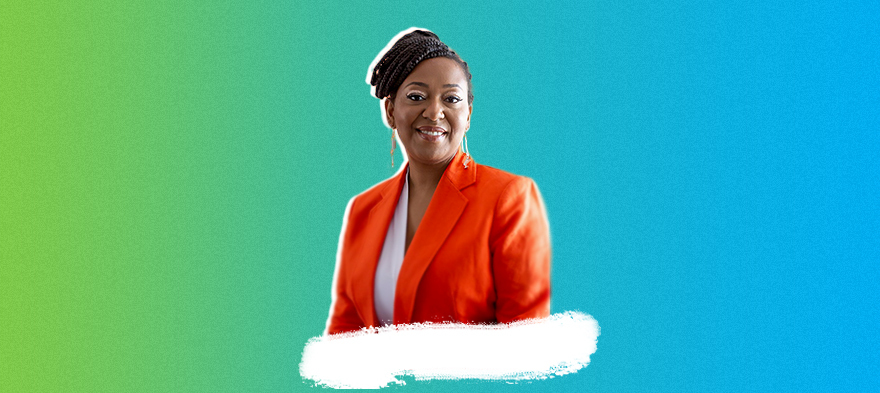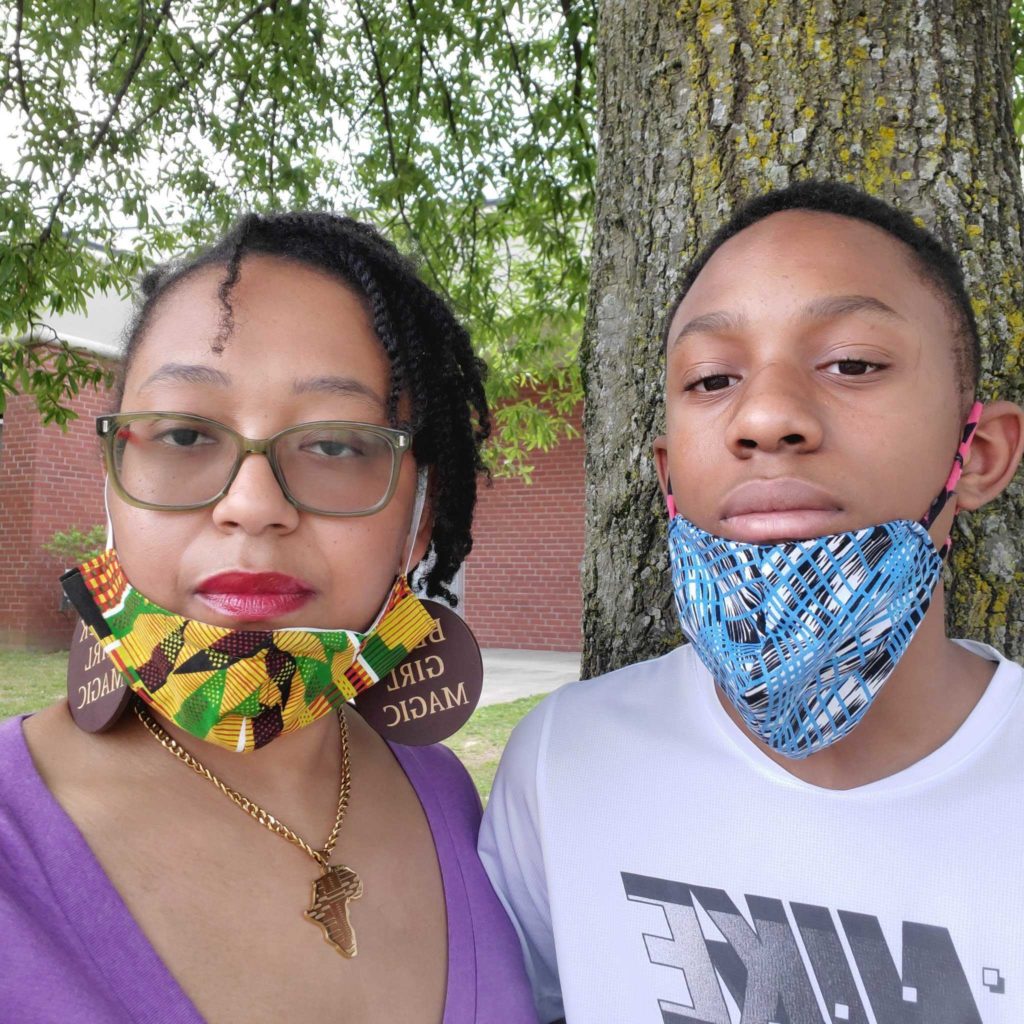
“I want to protect my children from the system that destroyed my parents.”
That’s Zakiya Sankara-Jabar, National Director of Activism at brightbeam, my new colleague and host of a virtual town hall on Wednesday with guests Nekima Levy-Armstrong, Tyson Amir, Rhonda Bryant, Chris Stewart, and Kedda Williams. What draws Zakiya, co-founder of Racial Justice NOW and community activist fellow at Wayfinder Foundation, to her work in child justice and empowerment for Black children? Why should you tune in on Wednesday, noon EDT?
See my interview with Zakiya below.
What was your childhood like?
I was born in Cleveland, right around the time when the city was rocked by the crack epidemic. My father was in prison on drug-related crimes and, by the time I was four, my mother was suffering from a combination of mental illness and drug addiction.
Once my mother’s grandparents found out, they made plans to come up north and take me home with them. My great-grandfather died before that happened, but my great-grandmother, Viola Williams, brought me back to her home in Beloit, a community in rural Alabama.
That must have been a big change for you.
It was! I had a very Black experience as a child, I attended all-Black schools and the legacy of the civil rights movement was all around me as a young child. Beloit was founded by Quakers from Wisconsin as part of their abolitionist activities—they bought up a lot of land and my great-grandfather was one of the beneficiaries—and we were a part of Alabama known as the “Black Belt.” At the time, all elected officials were White—the Black residents were effectively colonized.
I lived with my great-grandmother until she passed away when I was in ninth grade. Then my great aunt Creola Reese took me to Dayton, Ohio, where I finished high school and went to college. That’s where I met my husband and where both my children were born. That’s where my activism was born too—although people tell me I was an activist as a child—because by the time my little boy was 3-years-old the school system had already identified him as a “problem child.” They wanted to expel him from preschool! He started to say, “my teachers don’t like me” and “I don’t like school.”
I was in college then and I started to speak with other Black parents who were having similar experiences with their male children in particular. How can Black children go to school and have their spirits destroyed? I pulled my son out and put him in a safe environment.
But this experience politicized me, radicalized me, really, and is why I have an explicit focus within social justice on anti-Blackness.
Can you explain?
I had to protect my son from the system that had destroyed my parents, so I intuitively pushed back on the narrative. I dug into the data—Black boys, who comprise 16% of the enrollment, make up 51% of suspensions—and are inhumanely treated by school systems like Dayton’s.
You have a daughter too. Was her experience different than your son’s?
Yes, her experience in preschool was very different. It wasn’t perfect, but they didn’t want to expel her.
You don’t live in Dayton anymore.
My husband and I saw the writing on the wall. We were never going to have the time we needed to make systemic changes in time for our kids in a district ranked as one of the lowest in Ohio. The only option outside of Dayton was lily-White suburbs and I didn’t want my children to deal with that either. My husband is from Washington, D.C., and so we chose the suburb of Montgomery County, Maryland, to relocate and raise our children. We wanted to be near family and we wanted better opportunities for our children.
How did other Dayton activists respond, given all the grassroots work you’d done?
I was criticized for moving because people thought I was sacrificing the movement for my children. And Racial Justice NOW had made progress: We found an ally in State Senator Peggy Lehner and she had her team work with us on legislation to ban suspensions for children in pre-kindergarten through third grade. When her bill called the SAFE Act came to the floor, we had parents there from Cleveland, Cincinnati—all over Ohio—all testifying in front of a Republican Senate and Assembly. And the bill passed! We were successful with a project that larger, better-resourced groups like the ACLU of Ohio hadn’t been able to get done.
But I had to do what was right for my children.
What’s your experience been like in Montgomery County?
Well, my son is going into eighth grade in September and he’s in AP classes. He’s a budding activist, even though we’ve been very careful in protecting him. I’ll tell you, it’s a hell of a job being the mother of a Black young man, especially right now. I haven’t let him see the video of George Floyd, which is a modern-day lynching that happens over and over again, disproportionately to Black men.

But we’ve found that the Montgomery County Public Schools are well-funded and do fairly better than many districts serving Black children and other children of color. Our children are far better off than in Dayton schools.
Why is it important that people listen to the virtual town hall?
Laura, anti-Blackness is the fulcrum of White supremacy. At this moment, with COVID-19 and record unemployment, the burden is borne more fiercely by Black families. What we’re going to be talking about on Wednesday is critically important—child justice, looked at through a multi-faceted lens. The time is right for a new human rights movement that examines everything from the disproportionate death rate among Black people from COVID-19 to a police system that practices modern-day lynching to a culture that seems to have an overwhelming need to control Black bodies and bring them into submission.
But what I want more than anything is for people to be activated and inspired. With all these organizations devoted to centering children, we have a bright future. Yes, people are scared. Yes, people are angry. This town hall is an intervention into that fear. We want people to feel energized to join the movement, to be part of the solution and part of the change.
That’s hard, when things feel grim.
The birth of this country was rooted in brutality, in slavery. The savagery and depravity of police departments are organic outgrowths of this history. But the video of George Floyd, millions of people seeing him cry out for his mother as he dies, is a pivotal moment in social justice, a culmination where people say, “Enough is enough, this is criminal. We can not brutally murder people and call it justice.”
Let me tell you this: I’ve never been so inspired to see the uprising across the country as all types of people, all colors, march in the streets. They don’t have enough jail space to arrest everyone! This is grassroots activism! Every one of those people in the streets is a potential activist for finally reforming an educational and criminal justice system that preys on our children. This is our moment.
Laura Waters is the founder and managing editor of New Jersey Education Report, formerly a senior writer/editor with brightbeam. Laura writes about New Jersey and New York education policy and politics. As the daughter of New York City educators and parent of a son with special needs, she writes frequently about the need to listen to families and ensure access to good public school options for all. She is based in New Jersey, where she and her husband have raised four children. She recently finished serving 12 years on her local school board in Lawrence, New Jersey, where she was president for nine of those years. Early in her career, she taught writing to low-income students of color at SUNY Binghamton through an Educational Opportunity Program.
The fight for educational equity has never been just about schools. The real North Star for this work is providing opportunities for each child to thrive into adulthood. This means that our advocacy...
Your donation will support the work we do at brightbeam to shine a light on the voices who challenge decision makers to provide the learning opportunities all children need to thrive.
Ed Post is the flagship website platform of brightbeam, a 501(c3) network of education activists and influencers demanding a better education and a brighter future for every child.
© 2020–2024 brightbeam. All rights reserved.